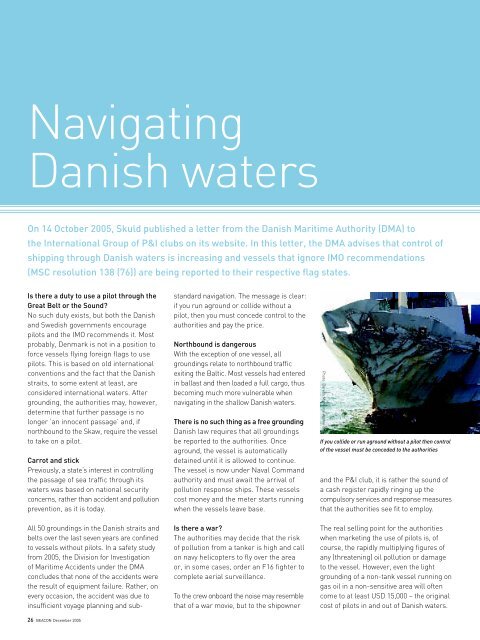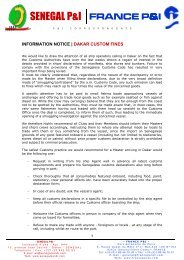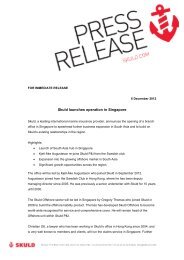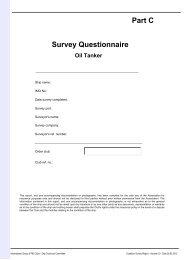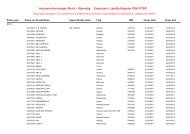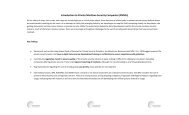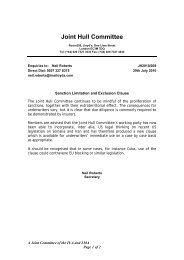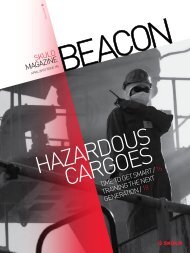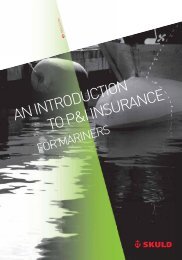Complete PDF version - Skuld
Complete PDF version - Skuld
Complete PDF version - Skuld
You also want an ePaper? Increase the reach of your titles
YUMPU automatically turns print PDFs into web optimized ePapers that Google loves.
NavigatingDanish watersOn 4 October 005, <strong>Skuld</strong> published a letter from the Danish Maritime Authority (DMA) tothe International Group of P&I clubs on its website. In this letter, the DMA advises that control ofshipping through Danish waters is increasing and vessels that ignore IMO recommendations(MSC resolution 8 (6)) are being reported to their respective flag states.Is there a duty to use a pilot through theGreat Belt or the Sound?No such duty exists, but both the Danishand Swedish governments encouragepilots and the IMO recommends it. Mostprobably, Denmark is not in a position toforce vessels flying foreign flags to usepilots. This is based on old internationalconventions and the fact that the Danishstraits, to some extent at least, areconsidered international waters. Aftergrounding, the authorities may, however,determine that further passage is nolonger ‘an innocent passage’ and, ifnorthbound to the Skaw, require the vesselto take on a pilot.Carrot and stickPreviously, a state’s interest in controllingthe passage of sea traffic through itswaters was based on national securityconcerns, rather than accident and pollutionprevention, as it is today.All 50 groundings in the Danish straits andbelts over the last seven years are confinedto vessels without pilots. In a safety studyfrom 2005, the Division for Investigationof Maritime Accidents under the DMAconcludes that none of the accidents werethe result of equipment failure. Rather, onevery occasion, the accident was due toinsufficient voyage planning and sub-standard navigation. The message is clear:if you run aground or collide without apilot, then you must concede control to theauthorities and pay the price.Northbound is dangerousWith the exception of one vessel, allgroundings relate to northbound trafficexiting the Baltic. Most vessels had enteredin ballast and then loaded a full cargo, thusbecoming much more vulnerable whennavigating in the shallow Danish waters.There is no such thing as a free groundingDanish law requires that all groundingsbe reported to the authorities. Onceaground, the vessel is automaticallydetained until it is allowed to continue.The vessel is now under Naval Commandauthority and must await the arrival ofpollution response ships. These vesselscost money and the meter starts runningwhen the vessels leave base.Is there a war?The authorities may decide that the riskof pollution from a tanker is high and callon navy helicopters to fly over the areaor, in some cases, order an F16 fighter tocomplete aerial surveillance.To the crew onboard the noise may resemblethat of a war movie, but to the shipownerPhoto: Danish Maritime AuthorityIf you collide or run aground without a pilot then controlof the vessel must be conceded to the authoritiesand the P&I club, it is rather the sound ofa cash register rapidly ringing up thecompulsory services and response measuresthat the authorities see fit to employ.The real selling point for the authoritieswhen marketing the use of pilots is, ofcourse, the rapidly multiplying figures ofany (threatening) oil pollution or damageto the vessel. However, even the lightgrounding of a non-tank vessel running ongas oil in a non-sensitive area will oftencome to at least USD 15,000 – the originalcost of pilots in and out of Danish waters.6 beacon December 2005


